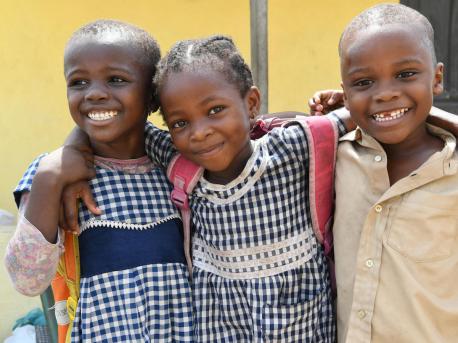
Kindness Counts on International Day of Friendship
Being kind and supportive is a big part of what it means to be a friend. It's also the first concrete step toward a more peaceful world. That's the message contained in the UNICEF #ENDviolence Youth Manifesto. Based on a recent poll which received more than 1 million thoughtful responses from young people in more than 160 countries over a five-week period, the manifesto offers a blueprint for a better, kinder future. And it all starts with friendship.
On July 30, in honor of International Day of Friendship, tell a friend how much they mean to you by sending them a kind note or giving them a hug. Here, children from around the globe show what friendship is all about:
Friends are supportive

Teenage girls hang out after school in Dolisie, Republic of Congo. Instability in Congo has disrupted the educations of thousands of children. This year, UNICEF and partners are reopening schools, training teachers and providing supplies to help 27,000 out-of-school children between the ages of 3 and 17 in Congo get back to learning. © UNICEF/UN0281684/Dejongh
Friends help each other out

A friend pushes Ilídio, 11, in his wheelchair so he can get to school in Mozambique. UNICEF and Handicap International have partnered with the Mozambique government to make sure that children with disabilities can get the special help they need to stay at home with their loving families, to go to school with their friends and to live a happy life. With the help of a physiotherapist who visited him at home, Ilídio managed to say his first words. Today he can read and write, and most importantly, he has friends to play with. © UNICEF/UN0324895
Friends lift your spirits

Girls share a happy moment in Hudaydah, Yemen. Four years of conflict in Yemen have left more than 24 million people — some 80 percent of the population — in need of humanitarian assistance, including 12.3 million children. UNICEF is on the ground in Yemen, working with partners to provide lifesaving support and services to help children cope with the trauma they've experienced and resume their childhoods. © UNICEF/UN0326762/
Friends stick together

One out of three children in Syria are out of school. Hussein and Mohamed, left and center, go to school together in Aleppo, Syria, but their friend Mustafa, 12, does not. He works to help support his family. UNICEF is working with partners to provide quality, inclusive education all children in Syria. In Aleppo, UNICEF is supporting a Self-Learning Program — a joint venture by Educate a Child (EAC), a global program of Education Above All — that allows out-of-school children between the ages of 6 and 15 to catch up with their peers by studying at home or in community centers with the help of volunteers or caregivers. © UNICEF/UN0287094/Grove Hermansen
Friends get your jokes

Two friends share a laugh at the UNICEF-supported Thouy Ampil Primary School in Thouy Ampil Village, Ja Oung Commune, Ratanakiri Province, Cambodia. In recent years, Cambodia has made impressive steps in economic growth, poverty reduction and education outcomes. But only 76 percent of boys finished primary school in 2017-2018. UNICEF is working with the Royal Government of Cambodia to improve graduation rates, especially among children from poorer rural households, through a scholarship program that encourages children to stay in school. © UNICEF/UN0322973/Seng
Friends hold each other up

A trio of friends hold hands in the village of Bolingo, in the center of Chad. More than half of all children between the ages of 5 and 18 are out of school in Chad. Girls are more likely to be out of school or to drop out; seven out of ten girls marry before their 18th birthday. UNICEF is working with Chad's Ministry of Education and the Korean International Cooperation Agency to promote equal educational opportunities for girls and boys. © UNICEF/UN0294788/Frank Dejongh
Friends share

In Cucuta, Colombia, students attend class at the Misael Pastrana School where about 70% of the students are Venezuelans who cross the border every morning to attend. UNICEF and partners are working to meet the urgent needs of Venezuelan children displaced by economic uncertainty and amping up support in host communities to encourage friendship and combat xenophobia. © UNICEF/UN0310005/Arcos
Please donate to help UNICEF spread the word: Everybody needs a friend.
Top photo: Happy friends embrace outside their UNICEF-supported school in Gonzagueville, a suburb of Abidjan, the capital of Côte d'Ivoire. © UNICEF/UN0288500/Frank Dejongh
HOW TO HELP
There are many ways to make a difference
War, famine, poverty, natural disasters — threats to the world's children keep coming. But UNICEF won't stop working to keep children healthy and safe.
UNICEF works in over 190 countries and territories — more places than any other children's organization. UNICEF has the world's largest humanitarian warehouse and, when disaster strikes, can get supplies almost anywhere within 72 hours. Constantly innovating, always advocating for a better world for children, UNICEF works to ensure that every child can grow up healthy, educated, protected and respected.
Would you like to help give all children the opportunity to reach their full potential? There are many ways to get involved.



